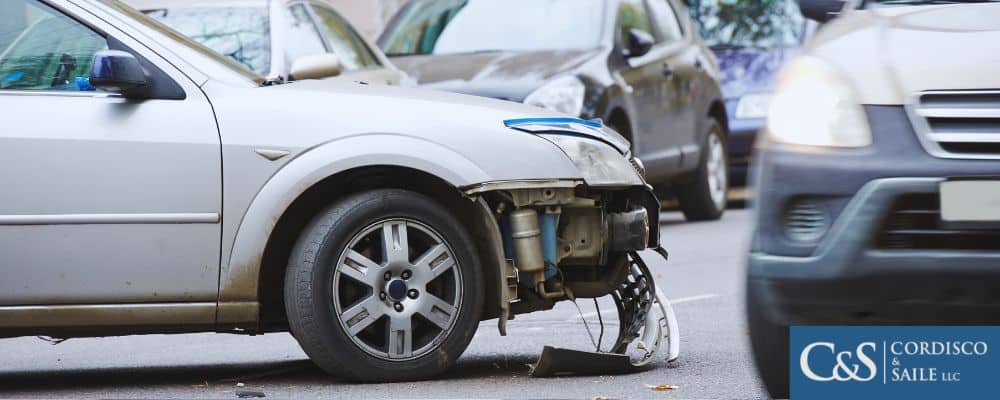Car Accident Statute of Limitations in Pennsylvania

The car accident statute of limitations in Pennsylvania limits the time for filing a lawsuit to two years from the crash date. If you miss this deadline, a judge will likely dismiss your case, and you will lose your chance at compensation.
There are rare exceptions to the statute of limitations for car accidents. It is far from guaranteed that a judge will grant you more time. It is best to consult an experienced car accident lawyer immediately after your crash. Quick action makes it easier to preserve evidence and build the strongest case to claim damages.
If you’ve been injured in a car accident in Pennsylvania, the experienced attorneys at Cordisco & Saile LLC can determine the deadline that applies and file your case on time to protect your rights to compensation.
Understanding the Statute of Limitations
A statute of limitations imposes the deadline by which you must file a civil lawsuit. While it may seem unfair to victims when they miss a statute of limitations and can’t pursue damages, these laws serve an essential purpose.
The deadline forces plaintiffs to file their cases within a reasonable time before witness memories fade or evidence is lost. Without a statute of limitations, a plaintiff could wait until a witness to a car accident dies. They also promote fairness by protecting defendants from the never-ending threat of litigation.
Each state’s legislature enacts its statute of limitations. Thus, they vary from state to state. For example, the statute of limitations for car crashes in Pennsylvania and New Jersey is two years, but in New York, it is three years.
The statute of limitations may also vary within a state. Legislatures do this to address the specific nature of some harms. For example, rather than having two years to file a claim for personal injury, child sex abuse victims in Pennsylvania have until their 55th birthday to file a lawsuit.
What Happens if I Don't File on Time?
If you do not file your lawsuit within the time limit set by the car crash statute of limitations, a judge will likely dismiss it. This is the case even if you miss the deadline by one day or have overwhelming evidence that the other party caused your crash and your injuries. If you miss the statute of limitations, you also lose negotiating power with the other party’s insurance company. It knows you can no longer file a lawsuit.
Hire an experienced attorney to assist in collecting evidence and determining your damages as quickly as possible after your accident. If negotiations drag out, you must leave enough time for your attorney to file a formal lawsuit within the two-year statute of limitations.
There are some limited exceptions to the statute of limitations. If you are unsure whether they apply to your case, talk to your attorney as soon as possible so you don’t miss your chance at compensation.
Statute of Limitations Exceptions
In some cases, the statute of limitations is not two years from the date of your accident. These exceptions include the following:
- For a wrongful death case, you have two years from the date of death to file suit rather than two years from the date of the accident.
- Pennsylvania “tolls” or pauses the statute of limitations for minors. Minors have two years from their 18th birthday to file suit.
- Under that same law, people who are incapacitated have two years from the date their incapacitation ends to file suit.
- If someone hides or leaves the state, the statute of limitations does not start until they return. If they leave after you’ve filed suit and are gone for at least four months, the time they are absent does not count.
- The deadline is six months to file a car accident claim against a government entity.
Do Hit-and-Run Accidents Have the Same Statute of Limitations?
Pennsylvania’s hit-and-run statute of limitations is the same two-year period as other car accidents. However, that does not mean you can’t collect compensation. Pennsylvania is a no-fault insurance state, so you must file a claim with your company first after an accident. Your uninsured motorist, or UM coverage, also covers hit and runs and accidents with uninsured motorists.
Pennsylvania’s Rule of Civil Procedure 2005 allows plaintiffs to substitute John or Jane Doe for an unknown defendant’s name in civil actions if they file within the statute of limitations. You must show that you thoroughly investigated to try to identify the party.
A judge determines whether to allow a Rule 2005 complaint, so your attorney’s skill in presenting your evidence is critical. If you identify the party after the hit-and-run statute of limitations, a judge will decide whether to hear the case. The rule specifically states that naming a Doe defendant does not indefinitely extend your time.
An Attorney Can Help You File Before the Deadline
An experienced car accident attorney can investigate your accident and determine the liable parties. They also are skilled at negotiating with insurance companies, giving you a chance at a fair settlement without going to court. The quality of the evidence your attorney gathers and their ability to present a strong case for damages significantly affect your chances of recovering compensation.
An attorney with a proven track record of helping accident victims also knows the unfair tactics insurance companies use to avoid paying fair compensation. They can successfully counter these strategies to pursue the compensation you are rightfully owed. And if they can’t negotiate a settlement, they will file your case on time and fight for you in court.
Get Help With Your Car Accident Claim Today
Our award-winning car accident attorneys in Pennsylvania have been practicing for over 30 years and have a proven record of successful case results. We’ve recovered millions of dollars for our deserving clients, including a $1.37 million arbitration award for a car accident victim who had previously received a lowball $85,000 offer from the insurance company.
Don’t risk letting the car accident statute of limitations expire in your case. Partner with our experienced team at Cordisco & Saile LLC so we can take on the burden of fighting for you while you focus on healing.
We work on a contingency fee basis, so you only pay us if we win. We won’t charge you any upfront fees or court costs and take on all the risks.
Call us today at 215-642-2335 or use our contact form to request a free consultation.







